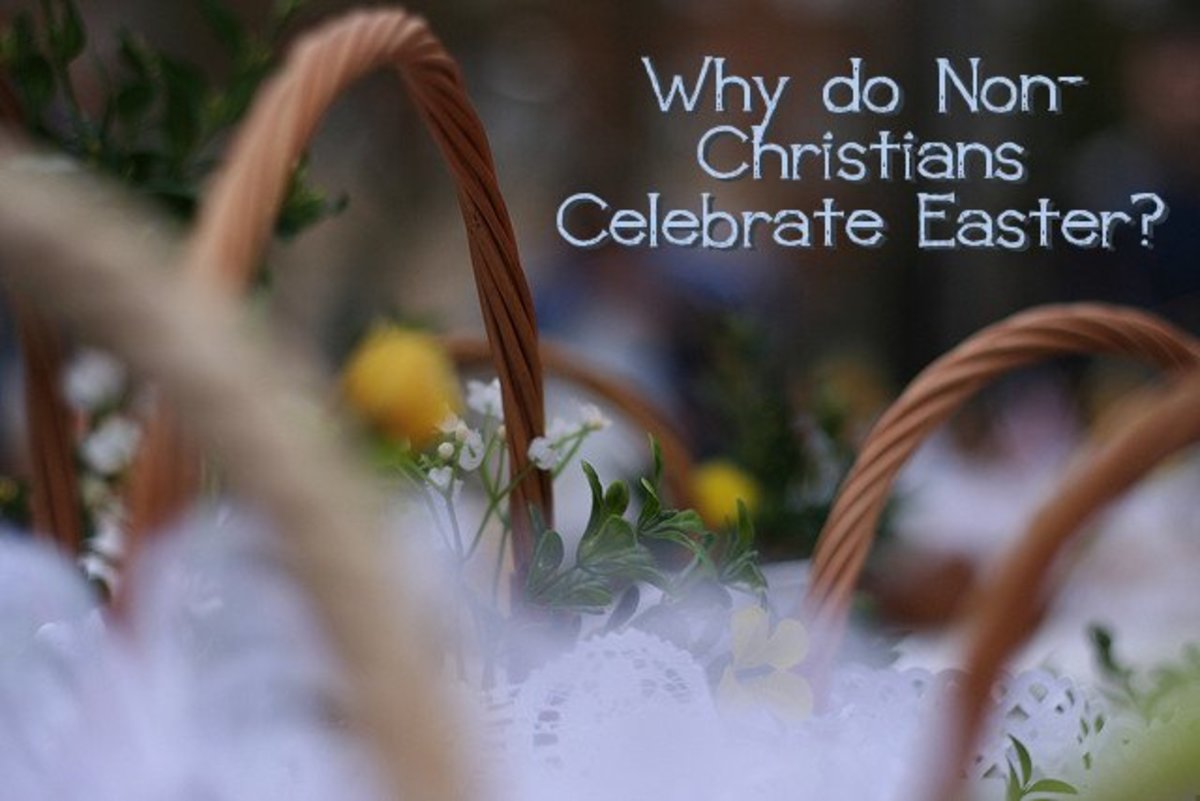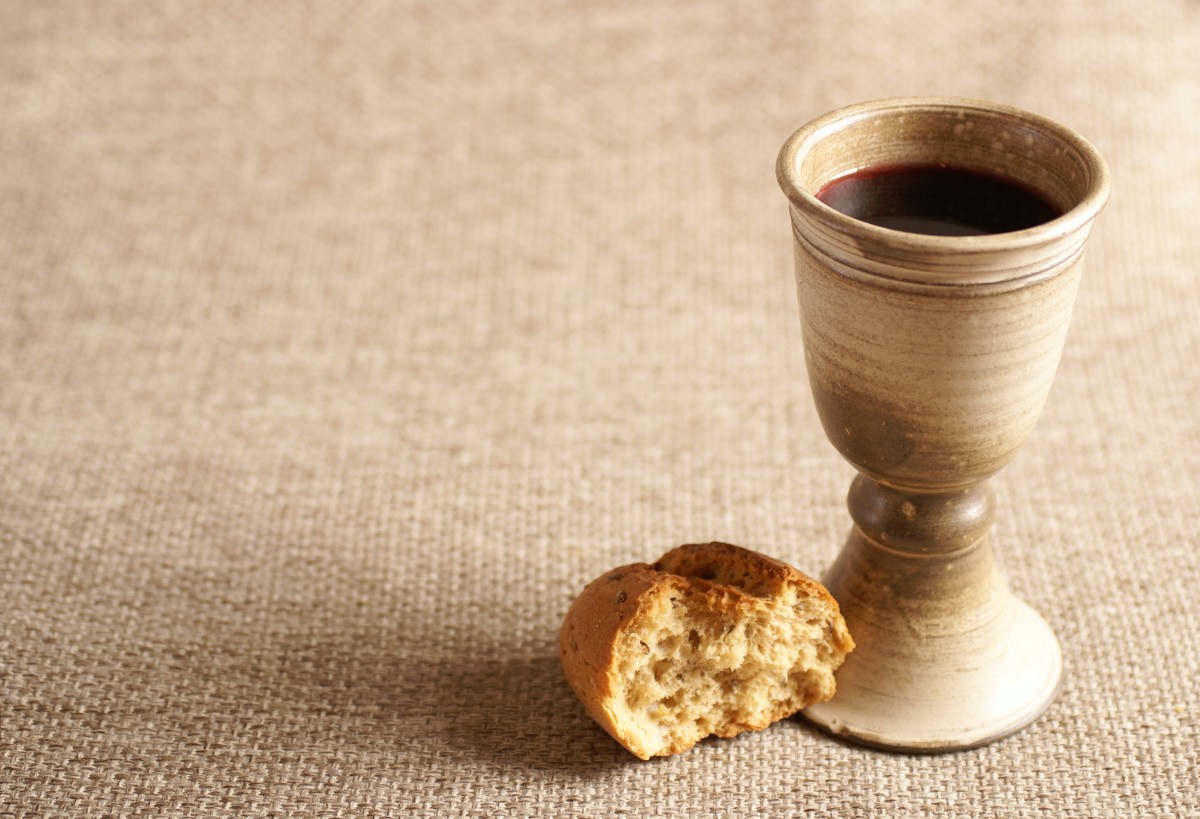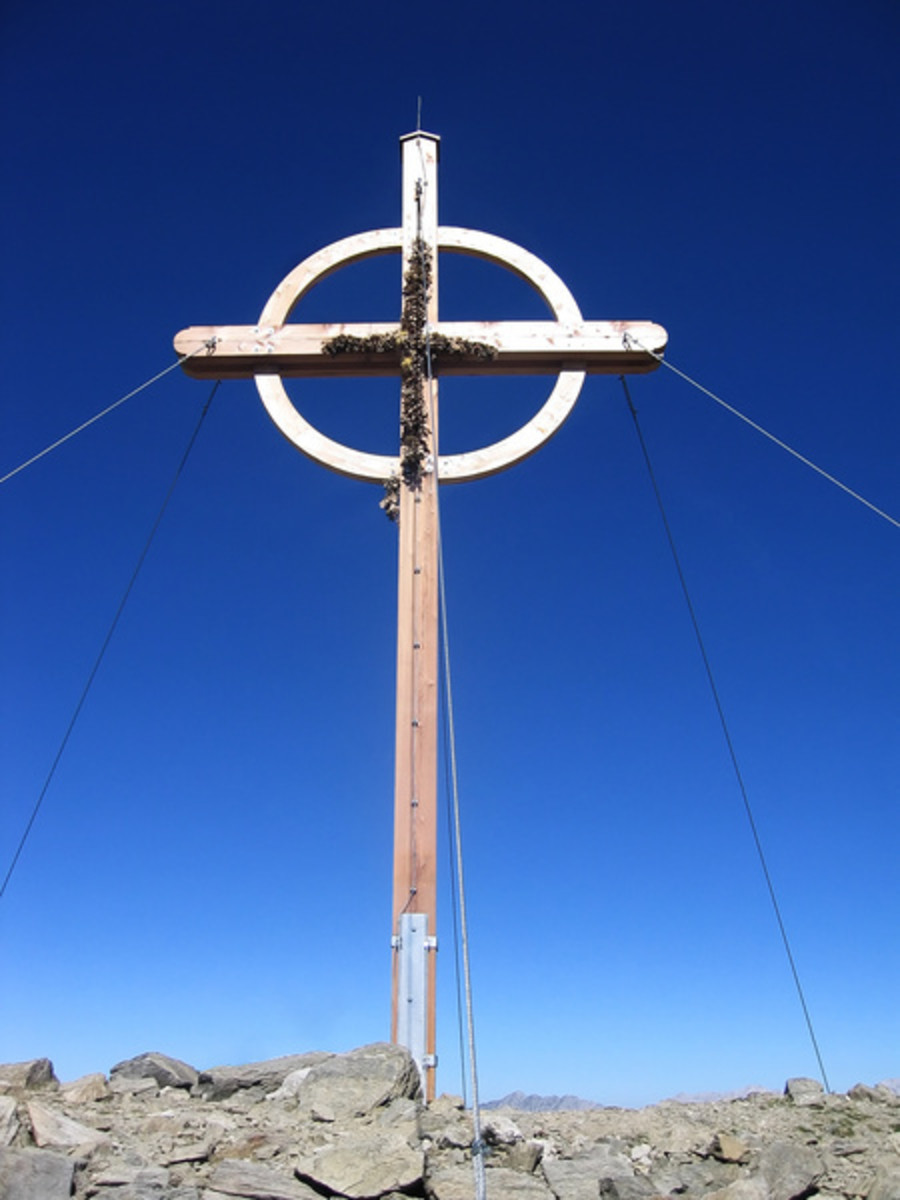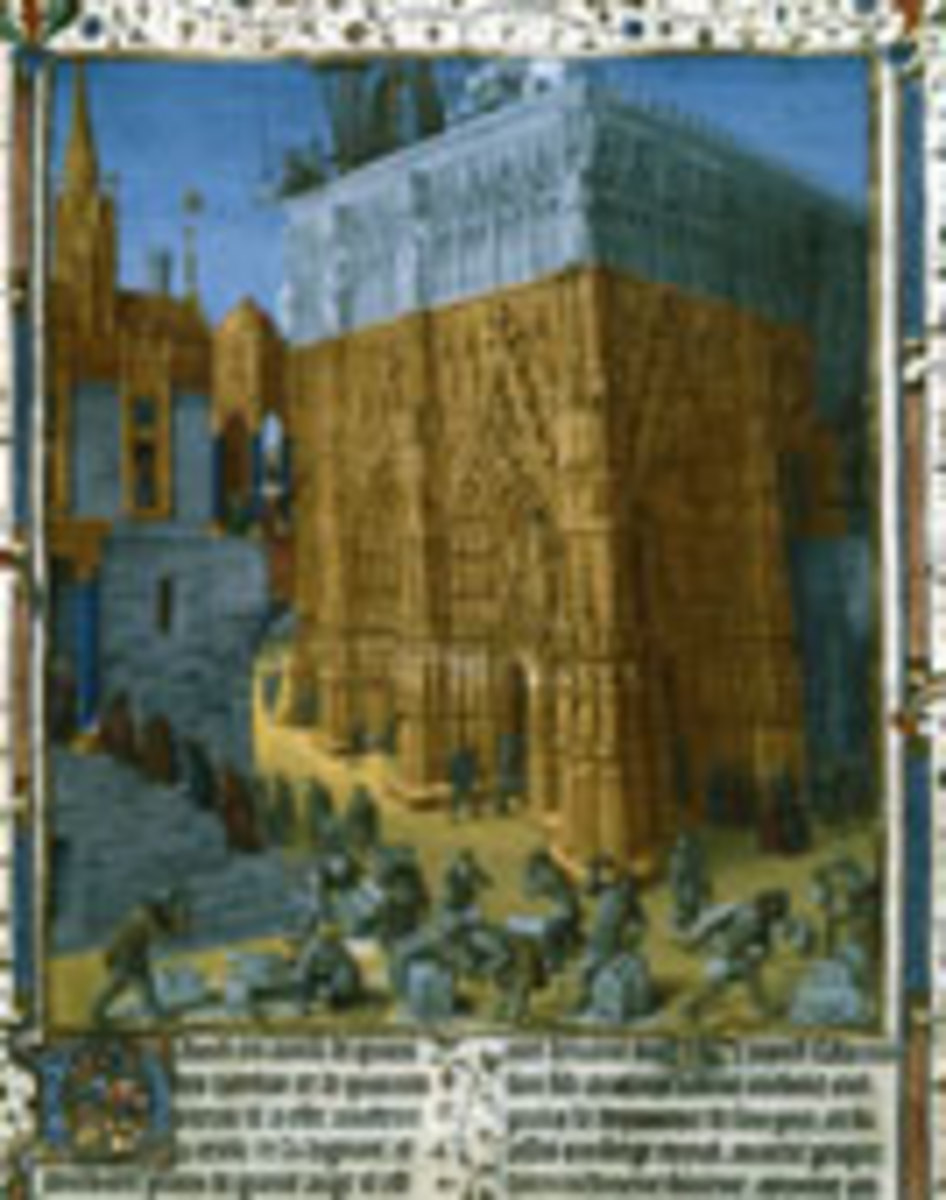CHOOSE HOLY COMMUNION OR EASTER
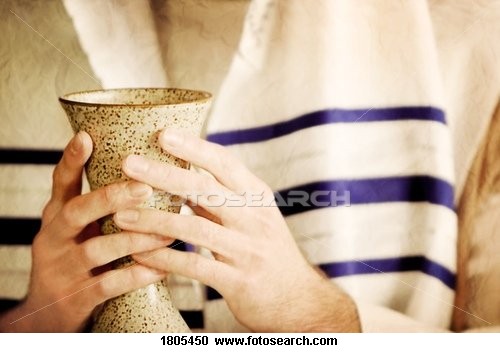
If you love me

HOLY COMMUNION
The memorial to the death of Jesus supercedes and is far more superior to the celebration of Easter today. Easter is to celebrate the resurrection of Jesus while the Holy Communion is to commemorate His death. The latter is solemn, reflective and beneficial to the soul. The actions and words of Jesus Christ should be considered without hesitation above any put forward by man. A moment captured in history secures forever the memory that is passed down through thousands of generations. No bible verse is cited to observe Easter for Easter had pagan origins, whereas the Lord Jesus said, "If ye love me, keep my commandments" (John 14:15)
Jesus is the Word and "the Word was made flesh, and dwelt among us, (and we beheld his glory, the glory as of the only begotten of the Father,) full of grace and truth (John 1:1,14). At the last supper, Jesus told the apostles to observe the Holy Communion until He returns.
We must obey God rather than man. The words of God are everlasting and beneficial while man's thoughts are fleeting like the grass and the flower. Jesus Christ came to this world about 2,000 years ago and preached to us for three and a half years. Before He died, Jesus had the last supper with His twelve chosen apostles in the upper chamber, which was quite bright and cheerful. After He took bread, gave thanks, broke it and said, "Take, eat: this is my body, which is broken for you; this do in remembrance of me." After the same manner also he took the cup, when he had supped, saying, "This cup is the new testament in my blood: this do ye, as oft as ye drink it, in remembrance of me." For as often as ye eat this bread, and drink this cup, ye do shew the Lord's death till he come (1 Corinthians 11:24-26).
These three verses are the New Covenant and A Feast of Remembrance of what the Lord Jesus had done for mankind in His short life on earth. Every time the disciples partake of the Holy Communion, they remember Jesus' love for them by sacrifing Himself on the cross and bearing the sins of the whole world on His shoulders. It would be a perpetual memorial until Jesus returns to this wicked, unrelenting and sinful world as a Judge to pass judgment upon the people once and for all..
Most importantly, we remember the death of Jesus, and treat it as sacred by our obedience to Him, and our doing all we can to please HIm and God. At 1 Samuel 15:22, we read, "Behold, to obey is better than sacrifice, and to hearken than the fat of rams;"
Jesus substituted himself as the sacrificial lamb of the Old Testament. Now Christians do not have to sacrifice a lamb for the passover, but partake of the bread (Himself) and cup (His shed blood). The Holy Communion replaces the passover in the Old Testament for Christians in the New Testament.
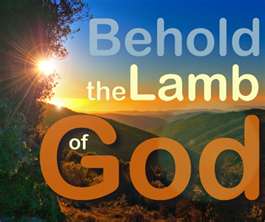
JESUS, THE SACRIFICIAL LAMB OF THE PASSOVER
godandscience.org/apologetics/ passover.html
How the Passover Reveals Jesus Christ
by Rick Deem
Resurrection
Christian symbolism in the Passover occurs early in the Seder (the Passover dinner). Three matzahs are put together (representing the Father, Son, and Holy Spirit). The middle matzah is broken, wrapped in a white cloth, and hidden, representing the death and burial of Jesus. The matzah itself is designed to represent Jesus, since it is striped and pierced, which was prophesized by Isaiah, David, and Zechariah. Following the Seder meal, the matzah is resurrected, which was foretold in the prophecies of David.
Christian communion
It was during a Passover seder that Jesus proclaimed that the meal represented Himself and that He was instituting the New Covenant, which was foretold by Jeremiah, Ezekiel, and Isaiah. The celebration of this covenant has become the ordinance of communion in the Christian Church. At the end of the meal, Jesus took the unleavened bread, broke it, and said that it represented His body. Then He took the cup of wine, which would have been the third cup of the Seder - the cup of redemption. He said that it was the new covenant in His blood poured out for you. It is through the sacrificial death and resurrection of Jesus Christ that we are declared clean before God, allowing those of us who choose to accept the pardon, to commune with Him - both now and forevermore through the eternal life He offers. Encylopedia Britannica, 11th edit.
Early Christians kept the Passover, not Easter. Notice this from Encyclopedia Britannica, 11th edit., Vol. 8, p. 828: “There is no indication of the observance of the Easter festival in the New Testament, or in the writings of the Apostolic Fathers…The first Christians continued to observe the Jewish festivals [God’s festivals of Leviticus 23, though in a new spirit, as commemorations of events which those festivals had foreshadowed. Thus the Passover, with a new conception added to it, of Christ as the true Paschal Lamb…continued to be observed.
When Easter Came to America
Easter has long been known to be a pagan festival! America’s founders knew this! A children’s book about the holiday, strong Parade Welcome Sweet Spring Time!, by Steve Englehart, p. 4, states, “When the Puritans came to North America, they regarded the celebration of Easter—and the celebration of Christmas—with suspicion. They knew that pagans had celebrated the return of spring long before Christians celebrated easter the first two hundred years of European life in North America, only a few states, mostly in the South, paid much attention to Easter.” Not until after the Civil War did Americans begin celebrating this holiday. Easter first became an American tradition in the 1870s” (p. 5). Remarkable! The original 13 colonies of America began as a “Christian” nation, with the cry of “No king but King Jesus!” The nation did not observe Easter within an entire century of its founding. What happened to change this?
They Did - Just as He Wanted
The earliest Christians celebrated the Lord's Passover at the same time as the Jews, during the night of the first full moon of the first month of spring (Nisan---Quoted From Eusebius, Ecclesiastical History, book V, chapters 23-25). the early Christians had followed the Jewish calendar and celebrated the death of Christ on the Passover which was the fourteenth of Nisan, the first month of the Jewish year...." quot; [Synod of] Whitby," Encyclopedia Britannica, VIII:859
"
JESUS THE WAY
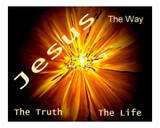
ORIGIN OF EASTER
Origin of EASTER - A Christian Commemoration
The origin of Easter, a holiday associated with the observance of the resurrection of Jesus Christ, is actually based on an ancient pagan celebration. Christians recognize this day as commemorating the culminating event of their faith, but like so many other "Christian" holidays, Easter has become commercialized and mixed with non-christian traditions like the Easter Bunny, Easter parades and hunting for Easter eggs. How did this happen?
Origin of Easter - Its Pagan Roots
The origin of Easter dates back to ancient times, not long after the global Flood recorded in Genesis 6-9 of the Bible. Nimrod, a grandson of Noah, had turned from following his grandfather's God and had become a tyrannical ruler. According to the biblical record, as king, Nimrod created Babel, Ninevah, Asshur, Calla and other cities, all known for lifestyles that promoted unspeakable evil and perversion. When Nimrod died, his wife, Queen Semiramis, deified him as the Sun-god, or Life Giver. Later he would become known as Baal, and those who followed the religion Semiramis created in his name would be called Baal worshippers. They became associated with idolatry, demon worship, human sacrifice and other practices regarded as evil.
The origin of Easter involves the birth of Semiramis' illegitimate son, Tammuz. Somehow, Semiramis convinced the people that Tammuz was actually Nimrod reborn. Since people had been looking for the promised savior since the beginning of mankind (see Genesis 3:15), they were persuaded by Semiramis to believe that Tammuz was that savior, even that he had been supernaturally conceived. Before long, in addition to worshipping Tammuz (or Nimrod reborn), the people also worshipped Semiramis herself as the goddess of fertility. In other cultures, she has been called Ishtar, Ashtur and yes, Easter.
The origin of Easter goes back to the springtime ritual instituted by Semiramis following the death of Tammuz, who, according to tradition, was killed by a wild boar. Legend has it that through the power of his mother's tears, Tammuz was "resurrected" in the form of the new vegetation that appeared on the earth.
According to the Bible, it was in the city of Babel that the people created a tower in order to defy God. Up until that time, all the people on the earth spoke one language. The building of the tower led God, as recorded in Genesis 11:7, to confuse their tongues to keep them from being further unified in their false beliefs. As the people moved into other lands, many of them took their pagan practices with them.
Contemporary traditions such as the Easter Bunny and the Easter egg can also be traced back to the practices established by Semiramis. Because of their prolific nature, rabbits have long been associated with fertility and its goddess, Ishtar. Ancient Babylonians believed in a fable about an egg that fell into the Euphrates River from heaven and from which Queen Astarte (another name for Ishtar or Semiramis) was "hatched."
GODDESS OF FERTILITY
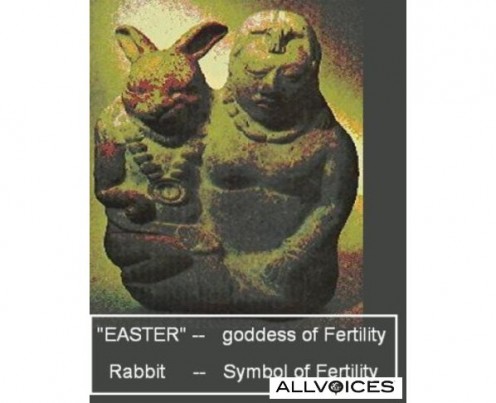
eostreII
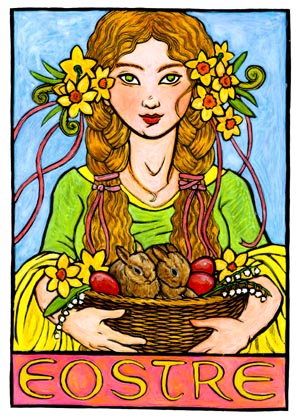
ORIGINS OF EASTER
Origins of the name "Easter":
The name "Easter" originated with the names of an ancient Goddess and God. The Venerable Bede, (672-735 CE.) a Christian scholar, first asserted in his book De Ratione Temporum that Easter was named after Eostre (a.k.a. Eastre). She was the Great Mother Goddess of the Saxon people in Northern Europe. Similarly, the "Teutonic dawn goddess of fertility [was] known variously as Ostare, Ostara, Ostern, Eostra, Eostre, Eostur, Eastra, Eastur, Austron and Ausos." 1 Her name was derived from the ancient word for spring: "eastre." Similar Goddesses were known by other names in ancient cultures around the Mediterranean, and were celebrated in the springtime. Some were:
Aphrodite from ancient Cyprus Ashtoreth from ancient Israel Astarte from ancient Greece Demeter from Mycenae Hathor from ancient Egypt Ishtar from Assyria Kali, from India Ostara a Norse Goddess of fertility.
An alternative explanation has been suggested. The name given by the Frankish church to Jesus' resurrection festival included the Latin word "alba" which means "white." (This was a reference to the white robes that were worn during the festival.) "Alba" also has a second meaning: "sunrise." When the name of the festival was translated into German, the "sunrise" meaning was selected in error. This became "ostern" in German. Ostern has been proposed as the origin of the word "Easter". 2
There are two popular beliefs about the origin of the English word "Sunday."
It is derived from the name of the Scandinavian sun Goddess Sunna (a.k.a. Sunne, Frau Sonne). 5,6 It is derived from "Sol," the Roman God of the Sun." Their phrase "Dies Solis" means "day of the Sun." The Christian saint Jerome (d. 420) commented "If it is called the day of the sun by the pagans, we willingly accept this name, for on this day the Light of the world arose, on this day the Sun of Justice shone forth." 7
COLOURED EGGS

OTHER PAGAN EASTER RITES
THE TRUE ORIGINS OF EASTER By David C. Pack
There are other Easter traditions that are pagan in origin. The Easter sunrise service is derived from the ancient pagan practice of welcoming the sun on the morning of the spring equinox, marking the beginning of spring. What we now call Easter lilies were revered by the ancients as symbols of fertility and representative of the male genitalia. The ancient Babylonian religions had rituals involving dyed eggs as did the ancient Egyptians.
The Christian version of Easter is celebrated after the first full moon after the vernal equinox. Modern day neo-pagans usually have their spring celebrations on the day of the equinox. Either way, these celebrations have gone on every year continuously for over 2500 years. So, next Sunday, if you go to an Easter sunrise service, hunt for colored eggs or eat marshmallow bunnies, remember you are indulging in pagan rituals that celebrate fertility and the advent of springtime!
TIME TO CHOOSE
It is now time to choose between the two, Holy Communion as instituted by Jesus Christ to remember His death until He returns or to observe Easter with its pagan orgins, coloured eggs, rabbits, easter bonnets, fancy clothing and colourful parades.
Deuteronomy 30:16-19
In that I command thee this day to love the Lord thy God, to walk in his ways, and to keep his commandments and his statutes and his judgments, that thou mayest live and multiply: and the Lord thy God shall bless thee in the land whither thou goest to possess it (v.16).
I call heaven and earth to record this day against you, that I have set before you life and death, blessing and cursing: therefore choose life, that both thou and thy seed may live (v.19).
1 John 5:3
For this is the love of God, that we keep his commandments: and his commandments are not grievous.
John 14:15
If ye love me, keep my (Jesus) commandments.
All glory to God. Amen.
History of Easter Video - Easter - HISTORY.com
► 3:32► 3:32www.history.com/...easter/videos/history-of-the-holi...A look at the origins of the holiest day on the Christian calender.
Pagan origin
CHRISTIANIZED PAGAN VALENTINE'S DAY http://hubpages.com/hub/christianizedpaganvalentine
WHY DO CHRISTIANS CELEBRATE PAGAN CHRISTMAS? http://hubpages.com/hub/whychristianscelebratepaganchristmas
GOD'S SABBATH OR MAN'S SABBATH http://hubpages.com/hub/godormansabbath?
Choose Holy Communion or Easter
Knowing the history of Easter, would you agree to choose Holy Communion instead?
Links
- Cracking Your Red Easter Eggs and other Greek Orthod...
The differences in Western Easter and Orthodox Easter are plentiful. Find out what some of these are here in this spectacular Greek Easter hub. - Origins of Chocolate Easter Eggs
March 13, 2011 While Easter Sunday (which in 2011 will be celebrated on April 24th in Western Christian churches) is still some some six weeks in the future as of this writing, store shelves are already...
© 2010 einron

